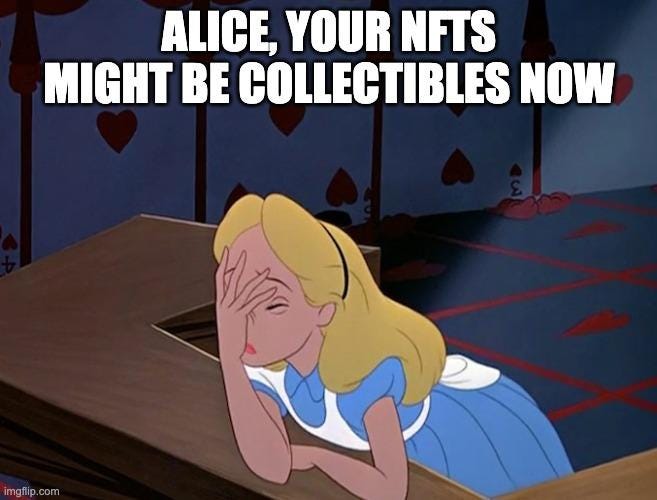NFT Taxes: All you Need to Know
Including an Important Update on ‘Phygital’ Collectibles
👋🏽 Hello everyone, gm gm!
We’re excited to announce that tickets are live for our final stop on the Overpriced Happy Hour Tour!! For this very special tour stop, Carly’s welcoming Real Vision CEO Raoul Pal to New York on Wednesday, October 11 from 6 - 8 pm.
OPJ and Real Vision NFT holders can use this link to snag your tickets today. Holders, please be sure to redeem your Overpriced Jin bottles if you haven’t already done so. Thanks and cheers! 🍸
Today’s OPJ newsletter is brought to you by Cryptoys!
Disney’s Mickey and Friends Cryptoys Drop is Live
Unbox and watch Mickey Mouse, Minnie Mouse and Pluto transform into cute collectibles with big personalities and adorable moves!
These 15 digital toys give fans a fun way to collect awesome skins across Common, Rare, Legendary, Grail and Ultra Grail rarities.
And each toy has an accessory: Mickey sports a fishing pole, Minnie carries a watering can, and Pluto won’t leave home without his bone.
Collectors can earn a Grail or Ultra Grail Sorcerer’s Apprentice Mickey by collecting all 12 (Common-Grail) or 15 (including Ultra Grail) rarities by 11/30/23.
Today we’re coming at you with a very timely post. If you’re among the 20 million Americans who filed for a tax extension this year - presumably because you burst a brain vein trying to figure out your crypto and NFTs - the Oct. 16 extension deadline is coming up quick. And if you’re not American, but also pay taxes, this post is for you too.
A whopping 420 million people traded crypto this year around the world and well, let’s just say the rules aren’t entirely clear. In today’s guest post, TokenTax co-founder Zac McClure aims to demystify NFT taxes, giving clarity for both collectors and creators alike. He’s also got the latest on an important tax hike you may have missed that affects ‘phygitals’ or any NFT that represents IRL ownership of a physical collectible.
Prior to co-founding TokenTax, Zac had a career in international finance and accounting at JPMorgan, Imprint Capital and Bain. He has worked in over a half-dozen countries and received his MBA from the UPenn Wharton School.
As NFTs achieved mainstream adoption, questions about their tax implications have emerged. There are now additional ambiguities around NFT taxes, as the IRS announced its intention to tax some NFTs as collectibles in March of 2023 using a “look-through” analysis.
In this article, we explore the intricacies of NFT taxes, the IRS' first NFT-specific guidance, and how investors and creators can navigate the mad, complicated world of NFT taxes.
As the digital revolution unfolds, NFTs, being novel and intangible assets, create challenges to determining their taxability to existing Internal Revenue Code. - Tynisa (Ty) Gaines, EA - Tax Expert, TokenTax
Down the Rabbit Hole: New IRS Guidance and “Look-Through” Analysis
On March 21, 2023 the IRS issued guidance that it could tax some NFTs at the collectibles rate, similar to art or gems, when sold. Based on the initial notice, long-term capital gains from selling NFTs that the IRS classifies as collectibles would be subject to a 28% rate, which is (of course) higher than current long-term capital gains rates that peak at 20%.
To determine whether an NFT is a collectible, the IRS will use a “look-through analysis” and decide whether the NFT is an asset or collectible as defined in the tax code.
“Until additional guidance is issued, the IRS intends to determine when an NFT is treated as a collectible by using a ‘look-through analysis.’ Under the look-through analysis, an NFT is treated as a collectible if the NFT's associated right or asset falls under the definition of collectible in the tax code. For example, a gem is a collectible under section 408(m); therefore, an NFT that certifies ownership of a gem is a collectible.” - IRS
This notably is the first NFT-specific guidance the IRS has issued. The agency requested public feedback through June 19, 2023. We anticipate more from the IRS on this topic and US taxpayers with NFTs will want to stay current and up to date.
What’s a Collectible to the IRS?
The March 2023 IRS guidance gives examples as to when an NFT might be considered a collectible or not. If an NFT signifies ownership of a physical gem, using the look-through analysis, that NFT would be considered a collectible as the underlying ownership right is over a gem (a collectible). Profits from its sale would then be taxed at the 28% collectibles rate.
As another example, the IRS imagines there is an NFT representing a plot of land within a virtual (metaverse) environment. In this case, it would not be classified as a collectible since it is not explicitly listed as such in section 408(m)(2) of the tax code. Collectible items per the IRS include:
(A) any work of art
(B) any rug or antique
(C) any metal or gem
(D) any stamp or coin
(E) any alcoholic beverage
(F) any other tangible personal property specified by the Secretary
This list indicates that in the case where an NFT represents ownership of any of the physical assets listed above, it constitutes a collectible. Pretty simple so far.
One of the more murky areas, however, is when the NFT itself is a work of art. The Louvre hasn’t shown Bored Apes (yet), despite what you might have heard. That noted, the IRS may come to reasonably conclude some NFTs are indeed artwork in and of themselves. This remains to be determined. Here’s the IRS’ statement on the matter from the March guidance.
“Applying the look-through analysis to an NFT if its associated right or asset is a digital file raises the question as to whether the digital file constitutes a ‘work of art’ under section 408(m)(2)(A) (in which case, the NFT would be a section 408(m) collectible). The Treasury Department and the IRS are considering the extent to which a digital file may constitute a ‘work of art’ under section 408(m)(2)(A).” - IRS
In other words:
The Absolute State of NFT Taxes in 2023
Beyond the uncertainty around the IRS’ pending collectibles approach and new guidance, here’s a summary of our essential NFT tax guide for 2023, which answers some commonly asked questions for both individual investors and creators. Taxpayers outside the US can refer to TokenTax’s helpful country guides for more specifics about NFT taxes in other regions.
Briefly, any crypto-to-crypto transaction related to NFTs, such as purchasing an NFT with cryptocurrency, trading one NFT for another, or selling an NFT for a fungible cryptocurrency, results in taxable capital gains or losses for hobbyists.
For professional creators and traders of NFTs, transactions are often considered ordinary income and taxed accordingly.
What Are the 2023 NFT Tax Rates?
Typically short-term gains from NFTs are subject to regular income tax rates, ranging from 10% to 37%. Long-term capital gains tax rates for NFTs and other cryptocurrencies vary between 0% and 20%.
As noted, certain NFTs may soon be classified as collectibles. The IRS applies a higher tax rate of 28% to collectibles held for over a year, exceeding the top long-term capital gains rate of 20% for other types of crypto assets.
How to Lower Your NFT Taxes Without Losing Your Head
To minimize your NFT tax obligations, you can employ several effective and legal strategies.
Holding NFTs for more than a year qualifies you for favorable long-term capital gains tax rates.
Selling NFTs for capital gains during a low-income year can potentially reduce your tax burden.
Offset gains by selling NFTs at a loss.
Purchase NFTs with fiat currency instead of crypto that has already appreciated in value.
Donate appreciated NFTs to a charity instead of selling them, which may offer tax benefits.
Give the Gift of an NFT and Get a Tax Break
When you donate an NFT to a qualified 501(c)(3) organization, it is not considered a taxable event and can potentially help lower your gross income, given that specific conditions are met:
The NFT was held for more than a year before the donation.
The donation is made directly to a 501(c)(3), which qualifies as a tax-exempt entity.
The NFT is directly given to the organization without involving any intermediary transactions.
On the other hand, exchanging an NFT for fiat or cryptocurrency typically results in tax obligations. So if you plan to donate an NFT, you must transfer it directly to the 501(c)(3) organization you want to support.
Auctioning the NFT for charity without first transferring it to the qualifying organization could lead to the former owner being liable for capital gains taxes on the auction proceeds, even if those proceeds are eventually donated.
Per the current tax law (as of 2023), cash donations are permitted up to 60% of adjusted gross income. Unused charitable deductions can generally be carried forward for five years.
Reporting NFT Taxes
US-based traders must report gains and losses from NFT sales on IRS Form 8949 along with Schedule D. Professional creators and minters of NFTs must report earnings as self-employment income, potentially making them subject to self-employment taxes. In all cases, specialized NFT tax software can simplify the reporting process.
NFT Taxes for Creators in 2023
Let’s look at the tax implications for US-based NFT creators and professionals with a concise overview of key points:
Taxes When Minting NFTs
Minting an NFT itself does not trigger taxes unless there are associated costs. If there is a fee for minting, it will be treated as a taxable event. For example, if minting an NFT requires 0.1 ETH, this cost is considered a trade of 0.1 ETH for the NFT.
Taxes When Selling NFTs
Selling an NFT that you created is regarded as a taxable event, and the proceeds from the sale are classified as capital gains. For creators whose profession or livelihood involves NFT creation, the assets are treated as inventory, and profits from NFT sales are subject to self-employment income tax, along with additional self-employment taxes. This rule extends to digital artists or NFT dealers professionally engaged in creating or trading NFTs.
Taxes on Royalties from NFTs
Regarding NFT royalty income, the IRS has not yet issued specific guidance. However, if you professionally mint NFTs as an artist or creator for an ongoing project and receive royalties from each sale, those royalties would likely be considered ordinary income.
As a result, you would be required to pay regular income tax and self-employment tax on the royalties, assuming NFT creation is an integral part of your profession or business. In some cases, if you have a one-off NFT sale generating royalties, it can be reported as passive income on Form Schedule E.
Tax Season and NFTs: It’s No Tea Party
With the IRS's recent guidance that it intends to classify some NFTs as collectibles, the complexity of NFT taxes can seem maddening at first. To ensure compliance with tax regulations, US-based taxpayers should seek the assistance of crypto tax professionals and software, which can simplify the reporting process for NFT transactions, making it easier to comply with tax obligations.
“Tax professionals must tailor guidance for NFTs to ensure clients can unlock the full potential of these cutting-edge assets while staying on the right side of the tax law.” - Tynisa (Ty) Gaines, EA - Tax Expert, TokenTax
And whether you’re hiring an expert or tackling taxes solo, our blog is a free, helpful resource both for U.S. and international crypto taxpayers, with a wealth of knowledge on all things crypto and NFT taxes. We update it regularly, so you’ll be in the know every time the IRS changes the rules for our Overpriced JPEGs.
Subscribe to Overpriced JPEGs!
🍎 Apple Podcasts 🟢 Spotify 🎥 YouTube 🎙 RSS Feed
(Don’t see your podcast player of choice? Find it here.)







